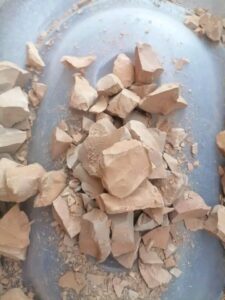
The community is reeling from the tragic death of Nthabiseng Mabusa, whose passing has sparked serious conversations and renewed warnings about the dangers of consuming traditional substances such as “clay soil,” locally known as mmu.
According to close friends and neighbours, Mabusa fell ill suddenly and battled a severe illness for six days before her untimely death. Those around her reported that she had been experiencing alarming symptoms, including excessive menstrual bleeding, severe constipation, and dehydration — all believed to be linked to her long-term consumption of the clay-like substance.

A friend of the deceased, who spoke with deep sorrow, shared distressing details about what doctors allegedly discovered. “They said her internal organs were dirty,” the friend revealed. “This broke us. We believe it’s because of that clay she was eating. I’m officially quitting today,” she added tearfully. “This is our poison, ladies. When it attacks, it does it once and harder.”
The friend also shared a moving account of her last encounter with Mabusa. “Yesterday when we went to check on her, she told us she was feeling better,” she recalled. “We were relieved, not knowing she was saying goodbye. She looked peaceful, as if she knew her time had come.” With heartfelt words, she concluded, “Rest in peace, Sis. You’ll be dearly missed.”
Mabusa’s death has left her family, friends, and the wider community in disbelief, prompting renewed discussions about traditional habits that are often passed down without awareness of their potential health risks. While the consumption of mmu is widely practiced in some communities — often by pregnant women or those craving the earthy taste — medical professionals have long cautioned against it.

Health experts warn that non-food-grade clay can contain harmful levels of heavy metals such as lead, arsenic, and mercury, which can cause poisoning and long-term damage to organs. Additionally, consuming clay can lead to intestinal blockages, dehydration, and exposure to dangerous bacteria or parasites present in unprocessed soil.
Dr. Lerato Mokoena, a local health practitioner, explained that while some people believe clay soil has detoxifying or medicinal properties, the reality is far more dangerous. “Clay consumption is a cultural practice in many parts of Africa, but medically, it poses serious risks. It can damage the digestive system, interfere with nutrient absorption, and introduce toxins into the body,” she said.
The heartbreaking loss of Nthabiseng Mabusa has served as a wake-up call for many. Across social media, users have been expressing their condolences and urging others to stop the practice. “We need to educate our sisters, mothers, and daughters,” one comment read. “This is not harmless — it’s taking lives.”
As the community continues to mourn, Mabusa’s death stands as a somber reminder of the importance of health awareness and the dangers of traditional practices that may cause more harm than good.




